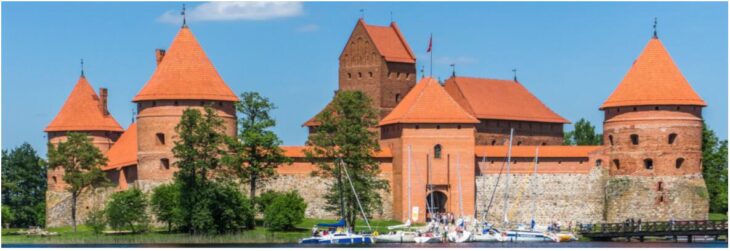History
Baltic tribes settled the territory of today’s Lithuania as early as 3,000 BC. BC Under Prince Mindaugas there was a “fusion” of the Baltic tribes in the 13th century and the first state was founded.
Also in the 13th century, the Brothers of the Sword and the Teutonic Order moved through the Baltic region and tried to convert the inhabitants to Christianity. While they have been successful in Estonia and Latvia, the Lithuanians have put up fierce resistance. The battle of Schaulen (Siaulilai) of 1236 is famous, in which the crusaders had to leave defeated: the Lithuanians had successfully defended themselves. The orientation towards Christianity came later when Lithuania merged with Catholic Poland in the 14th century. This union lasted for more than 400 years. The knights of the order, who did not give up despite the Christianization that had already taken place through the union with Poland, continued to try to enforce their power.
Lithuania and its two northern “sister states” have a similar history behind them in many respects, but they should not be lumped together. The parallels can be seen above all from the First World War, the German occupation, the Second World War and the annexation by Soviet Russia.
In 1918 the independent Lithuanian state was established. The democratic efforts were short-lived, however, and were turned into a dictatorship as early as 1926 by the coup of Antanas Smetona. During World War II, Germans and Soviets tried to subdue the country. In 1944 the Soviet Union took power. There were deportations of “enemies of the state”, reprisals and the suppression of the Lithuanian population.
The separation from the Soviet Union began in 1988 with the “Singing Revolution”. In 1989 two million people formed a chain from Tallinn via Riga to Vilnius and protested for the independence of the Baltic states. In 1990 Lithuania proclaimed the sovereign state, an effort the Soviets sought to suppress. In August 1991 there was the so-called Vilnius Blood Sunday, on which Soviet troops tried to forcefully end the independence movement. Unsuccessful: In the same year, the independence of Lithuania and the other Baltic states was finally achieved.
According to Countryaah, Lithuania has been a member of the EU and NATO since 2004 and the Schengen area since 2007. In the second half of 2013, Lithuania will hold the presidency of the EU Council.
Population
Lithuania today has almost 3 million inhabitants. Immediately after gaining independence, 3.7 million inhabitants were counted. In recent years there has been an increase in emigration, especially among the younger classes of the population – often in search of professional prospects in other European countries.
Ethnically speaking, more than 80 percent of the population are Lithuanians. In addition, Poles and Russians live in roughly equal proportions (5 to 6 percent) in the small country, as well as Belarusians (1 percent) and Ukrainians. The composition of the population is relatively homogeneous compared to Estonia and Latvia. In the two states there is a significant proportion of the population of Russian descent.
The Karaites represent an ethnic peculiarity. They are a Turkic people originating in Turkey who migrated to the Crimea and settled there in the mountains. The Karaites form an independent Jewish religious community and have split off from Judaism. Some of the Karaites were brought to Lithuania in the 14th century. Today, their descendants mainly live in Trakai.
Politics
Lithuania is a parliamentary democracy, headed by the President. Compared to the Federal President of Germany, the tasks are more extensive. Foreign policy, for example, is one of the President’s core tasks. President Dalia Grybauskaite is currently in power.
Opposite is the Prime Minister, he is the head of government of Lithuania.
The parliament is called Seimas and consists of 114 members who are elected for four years.
In 1991 Lithuania declared its independence from the Soviet Union. Lithuania has been a member of the EU and NATO since 2004 and the Schengen area since 2007. In the second half of 2013, Lithuania will hold the presidency of the EU Council.
Religion
Lithuania is predominantly Roman Catholic, around 80 percent of the population belong to the faith. There are also followers of the Russian Orthodox faith, above all the population of Russian descent.
There are also a small number of Evangelical Lutheran, Jewish and Islamic believers as well as adherents of the Old Faith. The Old Believers are a religious community that originated in the 17th century. Its founders were opponents of church reform by Patriarch Nikon, they split off and founded the “Old Faith”. From then on they were excluded from the Russian Church and persecuted. Another small religious community are the Karaites. They form an independent, Jewish religious community and have split off from Judaism.
